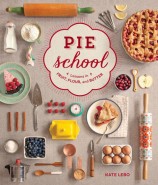
Book Review: Pie School: Lessons in Fruit, Flour, and Butter by Kate Lebo
Pie School: Lessons in Fruit, Flour, and Butter
Recipes by Kate Lebo, Photographs by Rina Jordan
Sasquatch Books, September 2014
ISBN-13: 978-1570619106
$24.95; 240 pp.
Reviewed by Alyse Bensel
Poetry and pie. If this seems an unlikely pairing, or if you’ve been having trouble channeling your inner poet and inner baker, Kate Lebo has offered up a sweet solution. A graduate of the MFA program at the University of Washington and an award-winning pie baker, Lebo has generously provided tips, methods, and meditations on pie for the beginning and advanced baker alike. The follow-up to the briefer Commonplace Book of Pie, which combines both prose poems and pie recipes, Pie School gives a more comprehensive, and beautifully photographed, look at the art of pie.
In the introduction, Lebo personably chronicles her upbringing as being “raised in the Pacific Northwest by Iowans,” who are “friendly people who’d rather eat than argue.” This introduction maps Lebo’s trajectory toward running her own pie school. “I learned the geography of my region at the grocery store. Cherries from Hood River, peaches from Yakima. Strawberries from Cornelius, plums from the neighbors’, blueberries from my own backyard,” she writes. In further seeking out the connections (and differences) between pie and poetry, Lebo notes, “Writing helped me understand that pie is a powerful symbol of American culture. More importantly, pie is a powerful gift. I’m writing this book to share that gift with you and to teach you how to tap into that power in your own kitchen.” In the labor of the book itself, and of the labor of the baker, arrives the inherent power for the reader to reflect on why they bake, too.
What follows the introduction is an array of meditations on the various aspects of baking pie: from ovens to love, the reader can delve into the technicalities and poetics of pie or move straight into the recipes. Lebo even notes in “On Recipes (or, How We Know What We Think We Know)” that she has given two kinds of recipes: ones that “provide clear guidance” and ones that “leave the details up to your imagination and whatever you find in your pantry.” For the reader who has mostly relied on store bought pie crust (such as this reviewer whose mother continuously instilled a horror in her that pie crust is one’s worst enemy), the comprehensive section “The Art and Science of Pie” provides a detailed written description and visual aid for Lebo’s pie crust method. It is labor intensive, meticulous, and particular, much like an effective imagistic poem. Lebo forbids kneading, always prefers hands to tools, and reminds the reader to rely on touch, feel, and experience in making pie crust dough.
The significant remainder of the book is dedicated to pie recipes written in crisp, clear directions that err on the side of less is more, an effective mantra for those who tend to overspice or oversugar. Recipes stay in the realm of fruit pies rather than chocolate, and include rhubarb (this reviewer’s favorite tart relative of celery), blueberry, cherry, peach, plums, blackberry, apple, a scattering of cream and chiffon pies, and any other imaginable combination.
This recipe book reaffirms a dedication to craft, brevity, and economy in both recipe and writing as a deeply connected physical and loving physical labor. The best recipes themselves are a work of art. This reviewer knows the power of such a book, where her own mother has already copied some of these recipes, and friends have begun to eye up this reviewer’s copy of Pie School, thinking of what pies they, too, can recreate or invent anew.
Alyse Bensel is the author of Not of Their Own Making (Dancing Girl Press, 2014) and Shift (Plan B Press, 2012). Her poetry has recently appeared in Mid-American Review, Heavy Feather Review, Sugar Mule, and Ruminate, among others. She serves as the Book Review Editor at The Los Angeles Review and Co-Edits Beecher’s.


Leave a Reply